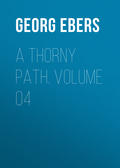
Georg Ebers
A Thorny Path. Volume 11
CHAPTER XXXIII
Melissa was once more alone.
She now knew that Philip walked no longer among the living. He must have fallen a victim to the fury of the monster, but the thought that he might have been slain for her sake left her mind no peace.
She felt that with the death of this youth—so gifted, and so dear to her—a corner-stone had been torn from the paternal house.
In the loving circle that surrounded her, death had made another gap which yawned before her, dismal and void.
One storm more, and what was left standing would fall with the rest.
Her tears flowed fast, and the torturing thought that the emperor had slain her brother as a punishment for his sister's flight pierced her to the heart.
Now she belonged indeed to the afflicted and oppressed; and as yesterday, in the trouble of her soul, she had called upon Jesus Christ, though she scarcely knew of Him then, so now she lifted up her heart to Him who had become her friend, praying to Him to remember His promise of comfort when she came to Him weary and heavy-laden.
And while she tried to realize the nature of the Saviour who had laid down His life for others, she remembered all she had dared for her father and brothers, and what fate had been her's during the time since; and she felt she might acknowledge to herself that even if Philip had met his death because of Caracalla's anger toward her, at any rate she would never have approached Caesar had she not wanted to save her father and brothers. She had never glossed over any wrong-doing of her own; but her open and truthful nature was just as little inclined to the torment of self-reproach when she was not absolutely certain of having committed a fault.
In this case she was not quite sure of herself; but she now remembered a saying of Euryale and Andreas which she had not understood before. Jesus Christ, it said, had taken upon Himself the sins of the world. If she understood its meaning aright, the merciful Lord would surely forgive her a sin which she had committed unwittingly and in no wise for her own advantage. Her prayer grew more and more to be a discourse with her new- found friend; and, as she finished, she felt absolutely sure that He at least understood her and was not angry with her. This reassured her, but her cheerfulness had fled, and she could read no more.
Deeply troubled, and more and more distressed as time went on by new disturbing thoughts, she hurriedly paced from side to side of the long, narrow chamber in the gathering darkness. The revolting images around her began to affect her unbearably once more. Near her chamber, to the west, lay the race-course with its horrible scenes; so she turned to the eastern end that looked out upon the street of Hermes, where the sight could scarcely be so terrible as from the windows at the opposite end. But she was mistaken; for, looking down upon the pavement, she perceived that this, too, swam with blood, and that the ground was covered with corpses.
Seized with a sudden horror, she flew back into the middle of the long room. There she remained standing, for the scene of slaughter in the west was still more appalling than that from which she had just fled. She could not help wondering who could here have fallen a victim to the tyrant after he had swept all the youth of the city off the face of the earth.
The evening sun cast long shafts of golden light across the race-course and in at the western window, and Melissa knew how quickly the night fell in Alexandria. If she wished to find out who they were who had been sacrificed to the fury of the tyrant, it must be done at once, for the immense building of the temple already cast long shadows. Determined to force herself to look out, she walked quickly to the eastern window and gazed below. But it was some moments before she had the fortitude to distinguish one form from another; they melted before her reluctant eyes into one repulsive mass.
At last she succeeded in looking more calmly and critically.
Not heaped on one another as on the racecourse, hundreds of Caracalla's victims lay scattered separately over the open square as far as the entrance to the street of Hermes. Here lay an old man with a thick beard, probably a Syrian or a Jew; there, his dress betraying him, a seaman; and farther on-no, she could not be mistaken—the youthful corpse that lay so motionless just beneath the window was that of Myrtilos, a friend of Philip, and, like him, a member of the Museum.
In a fresh fit of terror she was going to flee again into her dreadful hiding-place, when she caught sight of a figure leaning against the basin of the beautiful marble fountain just in front of the eastern side-door of the Serapeum, and immediately below her. The figure moved, and could therefore only be wounded, not dead; and round the head was bound a white cloth, reminding her of her beloved, and thereby attracting her attention. The youth moved again, turning his face upward, and with a low cry she leaned farther forward and gazed and gazed, unmindful of the danger of being seen and falling a victim to the tyrant's fury. The wounded, living man-there, he had moved again—was no other than Diodoros, her lover!
Till the last glimmer of light disappeared she stood at the window with bated breath, and eyes fixed upon him. No faintest movement of his escaped her, and at each one, trembling with awakening hope, she thanked Heaven and prayed for his rescue. At length the growing darkness hid him from her sight. With every instant the night deepened, and without thinking, without stopping to reflect—driven on by one absorbing thought—she felt her way back to her couch, beside which stood the lamp and fire-stick, and lighted the wick; then, inspired with new courage at the thought of rescuing her lover from death, she considered for a moment what had best be done.
It was easy for her to get out. She had a little money with her; on her peplos she wore a clasp that had once belonged to her mother, with two gems in it from her father's hand, and on her rounded arm a golden circlet. With these she could buy help. The only thing now was to disguise herself.
On the great, smoke-blackened metal plate over which those mystics passed who had to walk through fire, there lay plenty of charcoal, and yonder hung robes of every description. The next moment she had thrown off her own, in order to blacken her glistening white limbs and her face with soot. Among the sewing materials which the lady Euryale had laid beside the scrolls was a pair of scissors. These the girl seized, and with quick, remorseless hand cut off the long, thick locks that were her brother's and her lover's delight. Then she chose out a chiton, which, reaching only to her knees, gave her the appearance of a boy. Her breath came fast and her hands trembled, but she was already on her way to the secret door through which she should flee from this place of horror, when she came to a standstill, shaking her head gently. She had looked around her, and the wild disorder she was leaving behind her in the little room went against her womanly feelings. But though this feeling would not in itself have kept her back, it warned her to steady her mind before leaving the refuge her friend had accorded to her. Thoughtful, and accustomed to have regard for others, she realized at once how dangerous it might prove to Euryale if these unmistakable traces of her presence there should be discovered by an enemy. The kindness of her motherly friend should not bring misfortune upon her. With active presence of mind she gathered up her garments from the floor, swept the long locks of hair together, and threw them all, with the sewing and the basket that had contained the food, into the stove on the hearth, and set them alight. The scissors she took with her as a weapon in case of need.
Then, laying the books of the gospels beside the other manuscripts, and casting a last look round to assure herself that every sign of her presence had been destroyed, she addressed one more prayer to the tender Comforter of the afflicted, who has promised to save those that are in danger.
She then opened the secret door.
With a beating heart, and yet far more conscious of the desire to save her lover while there was yet time than of the danger into which she was rushing headlong, she flitted down the hidden staircase as lightly as a child at play. So much time had been lost in clearing the room—and yet she could not have left it so!
She had not forgotten where to press, so that the heavy stone which closed the entrance should move aside; but as she sprang from the last step her lamp had blown out, and blackest darkness concealed the surface of the smooth granite wall which lay between her and the street.
What if, when she got outside, she should be seen by the lictors or spies?
At this thought fear overcame her for the first time. As she felt about the door her hands trembled and beads of perspiration stood upon her brow. But she must go to her wounded lover! When any one was bleeding to death every moment might bring the terrible "too late." It meant Diodoros's death if she did not succeed in opening the granite slab.
She took her hands from the stone and forced herself, with the whole strength of her will, to be calm.
Where had been the place by pressing which the granite might be moved?
It must have been high up on the right side. She carefully followed with her fingers the groove in which the stone lay, and having recalled its shape by her sense of touch, she began her search anew. Suddenly she felt something beneath her finger-tips that was colder than the stone. She had found the metal bolt! With a deep breath, and without stopping to think of what might be before her, she pressed the spring; the slab turned-one step-and she was in the street between the racecourse and the Serapeum.
All was still around her. Not a sound was to be heard except from the square to the north of the temple, where all who carried arms had gathered together to enjoy the wine which flowed in streams as a mark of the emperor's approbation, and from the inner circle of the race-course voices were audible. Of the citizens not one dared show himself in the streets, although the butchery had ceased at sundown. All who did not carry the imperial arms had shut themselves up in their houses, and the streets and squares were deserted since the soldiers had assembled in front of the Serapeum.
No one noticed Melissa. The dangers that threatened her from afar troubled her but little. She only knew that she must go on—go on as fast as her feet would carry her, if she were to reach her loved one in time.
Skirting the south side of the temple, in order to get to the fountain, her chief thought was to keep in its shadow. The moon had not yet risen, and they had forgotten to light either the pitch-pans or the torches which usually burned in front of the south facade of the temple. They had been too busy with other matters to-day, and now they needed all hands in heaping the bodies together. The men whose voices sounded across to her from the race-course had already begun the work. On—she must hurry on!
But it was not so easy as last night. Her light sandals were wet through, and there was ever a fresh impediment in her way. She knew what it was that had wetted her foot—blood—noble, human blood—and every obstacle against which she stumbled was a human body. But she would not let herself dwell upon it, and hurried on as though they were but water and stones, ever seeing before her the image of the wounded youth who leaned against the basin.
Thus she reached the east side of the temple. Already she could hear the splashing of the fountain, she saw the marble gleaming through the darkness, and began seeking for the spot where she had seen her lover. She suddenly stopped short; at the same time as herself, lights faint and bright were coming along from the south, from the entrance of the street that led to Rhakotis, and down to the water. She was in the middle of the street, without a possibility of concealing herself except in one of the niches of the Serapeum.
Should she abandon him? She must go on, and to seek protection in the outer wall of the temple meant turning back. So she stood still and held her breath as she watched the advancing lights. Now they stopped. She heard the rattle of arms and men's voices. The lantern-bearers were being detained by the watch. They were the first soldiers she had seen, the others being engaged in drinking, or in the work on the race-course. Would the soldiers find her, too? But, no! They moved on, the torch- bearers in front, toward the street of Hermes.
Who were those people who went wandering about among the slain, turning first to this side and then to that, as if searching for something?
They could not be robbing the dead, or the watch would have seized them.
Now they came quite close to her, and she trembled with fright, for one of them was a soldier. The light of the lantern shone upon his armor. He went before a man and two lads who were following a laden ass, and in one of them Melissa recognized with beating heart a garden slave of Polybius, who had often done her a service.
And now she took courage to look more closely at the man—and it was— yes, even in the peasant's clothes he wore he could not deceive her quick eyes—it was Andreas!
She felt that every breath that came from her young bosom must be a prayer of thanksgiving; nor was it long before the freedman recognized Melissa in the light-footed black boy who seemed to spring from the earth in order to show them the way, and he, too, felt as if a miracle had been wrought.
Like fair flowers that spring up round a scaffold over which the hungry ravens croak and hover, so here, in the midst of death and horror, joy and hope began to blossom in thankful hearts. Diodoros lived! No word- only a fleeting pressure of the hand and a quick look passed between the elderly man and the maiden—who looked like a boy scarcely passed his school-days—to show what they felt as they knelt beside the wounded youth and bound up the deep gash in his shoulder dealt by the sword that had felled him.
A little while afterward, Andreas drew from the basket which the ass carried, and from which he had already taken bandages and medicine, a light litter of matting. He then lifted Melissa on to the back of the beast of burden, and they all moved onward.
The sights that surrounded them as long as they were near the Serapeum forced her to close her eyes, especially when the ass had to walk round some obstruction, or when it and its guide waded through slimy pools. She could not forget that they were red, nor whence they came; and this ride brought her moments in which she thought to expire of shuddering horror and sorrow and wrath.
Not till they reached a quiet lane in Rhakotis, where they could advance without let or hindrance, did she open her eyes. But a strange, heavy pain oppressed her that she had never felt before, and her head burned so that she could scarcely see Andreas and the two slaves, who, strong in the joy of knowing that their young lord was alive, carried Diodoros steadily along in the litter. The soldier—it was the centurion Martialis, who had been banished to the Pontus—still accompanied them, but Melissa's aching head pained her so much that she did not think of asking who he was or why he was with them.
Once or twice she felt impelled to ask whither they were taking her, but she had not the power to raise her voice. When Andreas came to her side and pointed to the centurion, saying that without him he would never have succeeded in saving her beloved, she heard it only as a hollow murmur, without any consciousness of its meaning. Indeed, she wished rather that the freedman would keep silent when he began explaining his opportune arrival at the fountain, which must seem such a miracle to her.
The slave-brand on his arm had enabled him to penetrate into the house of Seleukus, where he hoped to obtain news of her. There Johanna had led him to Alexander, and with the Aurelians he had found the centurion and the slave Argutis. Argutis had just returned from the lady Euryale, and swore that he had seen the wounded Diodoros. Andreas had then declared his intention of bringing the son of his former master to a place of safety, and the centurion had been prevailed upon by the young tribunes to open a way for the freedman through the sentinels. The gardeners of Polybius, with their ass, had been detained in an inn on this side of Lake Mareotis by the closing of the harbor, and Andreas had taken the precaution of making use of them. Had it not been for the centurion, who was known to the other soldiers, the watch would never have allowed the freedman to get so far as the fountain; Andreas therefore begged Melissa to thank their preserver. But his words fell upon her ear unnoticed, and when the strange soldier left her to devote himself again to Diodoros she breathed more freely, for his rapidly spoken words hurt her.
If he would only not come again—only not speak to her!
She had even ceased to look for her lover. Her one desire was to see and hear nothing. When she did force herself to raise her heavy, throbbing lids, she noticed that they were passing poor-looking houses which she never remembered seeing before. She fancied, however, from the damp wind that blew in her face and relieved her burning head, that they must be nearing the lake or the sea. Surely that was a fishing-net hanging yonder on the fence round a but on which the light of the lantern fell. But perhaps it was something quite different, for the images that passed before her heavy eyes began to mingle confusedly, to repeat themselves, and be surrounded by a ring of rainbow colors. Her head had grown so heavy that her mind had lost all sense of hope or fear; only her thoughts stirred faintly as the procession moved on and on through the darkness, without a pause for rest.
When they had passed the last of the huts she managed to look upward.
The evening star stood out clear against the sky, and she seemed to see the other stars revolving quickly round it.
Her mouth was painful and parched, and more than once she had been seized with giddiness, which forced her to hold tightly to the saddle.
Now they stopped beside a large piece of water, and she felt strangely well and light of heart. That must be the dear, familiar lake. And there stood Agatha waving to her, and at her side the lady Euryale under the spreading shade of a mighty palm. Bright sunshine flooded them both, and yet it was the night; for there was the evening star beaming down upon her.
How could that be?
Yet, when she tried to understand it all, her head pained her so, and she turned so giddy, that she clutched the neck of the ass to save herself from falling.
When she raised herself again she saw a large boat, out of which several people came to meet them, the foremost of them a tall man in a long, white garment. That was no dream, she was quite certain. And yet-why did the lantern which one of them held aloft burn her face so much and not his? Oh, how it burned!
Everything turned in a circle round her, and grew dark before her eyes.
But not for long; suddenly it became light as day, and she heard a deep and friendly voice calling her by name. She answered without fear, "Here am I," and saw before her a stranger in a long, white robe, of lofty yet gentle aspect, just as she had imagined the crucified Saviour of the Christians, and in her ear sounded the loving message with which he bids the weary and heavy-laden come to him that he may give them rest.






